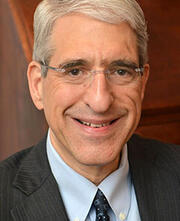To the Yale Community,
I am delighted to announce that the Yale board of trustees has voted to transform the Jackson Institute for Global Affairs into a school—the Yale Jackson School of Global Affairs. I am grateful and thrilled to report that John Jackson ’67 and Susan Jackson have made a transformative gift, through the Liana Foundation, to launch the new school. Their generosity will allow us to write a new chapter in our history.
For centuries, Yale faculty, students, alumni, and staff have contributed to creating a better future for people worldwide—demonstrating that research and education are essential to the health and well-being of society. Now more than ever before, our world needs creative ideas to help end global conflicts and heal individuals and communities. By establishing the Yale Jackson School of Global Affairs, Yale will continue to fulfill its responsibility to teach students to become leaders who will tackle challenges with wisdom, facts, insight, and courage.
We plan for fundraising to be completed and the school to open in the fall of 2022. The provost and I will appoint a transitional committee to govern the Jackson Institute in collaboration with its director, James Levinsohn, Charles W. Goodyear Professor in Global Affairs and professor of economics and management. We estimate that endowed funds of an additional $200 million will be needed to create a successful school of global affairs. We are well on the way to meeting that requirement, and the school will be fully gift-funded before it opens.
I have written about the academic priorities we have set for the years ahead. One is the application of social science research to the great issues of the day. We have advanced this priority through a number of initiatives, and the conversion of the institute into the Yale Jackson School of Global Affairs is an important step forward for our academic strategy.
The research conducted at the new school will provide the intellectual foundation for evidence-based policy-making. Its graduates will become the leaders the world needs to resolve the complex dilemmas facing us in areas such as climate change, migration, war, health, and inequality. This will help advance our mission to improve the world; it will also benefit our faculty, students, and staff in the pursuit of educational and scholarly excellence.
As many of you know, last November, the Provost’s Advisory Committee on the Future of the Jackson Institute released its report, which recommended the creation of a school of global affairs that is small, excellent, interconnected, and deeply academically grounded. Over the last few months, I have had many conversations with members of the university community about the Jackson Institute’s future. I am grateful for the input of the faculty members who attended two town halls to discuss the report in January and for the comments many of you emailed me or submitted online. There is broad support for the recommendations of the Jackson committee and for bringing new resources to bear on the study and teaching of global affairs at Yale.
I would like to take this opportunity to thank Professor Judith Chevalier, the William S. Beinecke Professor of Economics and Finance at the Yale School of Management, and the members of the committee she chaired for their hard work and dedication. For over eighteen months, they studied the record of the Jackson Institute and met with students, faculty, and practitioners at Yale and peer schools. Their report provides invaluable guidance for how Yale can continue to educate global citizens, provide knowledge, and inform policy with data-driven research in the years ahead.
The Yale Jackson School will not only raise Yale’s profile as a center for international scholarship, ideas, and influence, it will also allow us to fulfill Yale’s responsibility as a great university. The founding of the Yale Jackson School provides a once-in-a-generation opportunity to strengthen Yale’s role in educating global citizens and leaders who will write international law, direct global corporations, shape economic and climate policies, lead militaries, and much more.
We will not abolish war or poverty, but scholars, practitioners, and students at Yale can work together to understand the roots of war and peace, the most effective ways of encouraging economic development, the effects of environmental change, and the causes of global health challenges. In the future, leaders educated at Yale and elsewhere will put these findings into practice.
I look forward to being able to celebrate the Yale Jackson School’s opening, but even more, I am looking forward to witnessing the difference the Yale Jackson School, its scholars, and its students will make in the world.
P.S. For more information, please read the YaleNews story “Yale to launch Jackson School of Global Affairs.”

